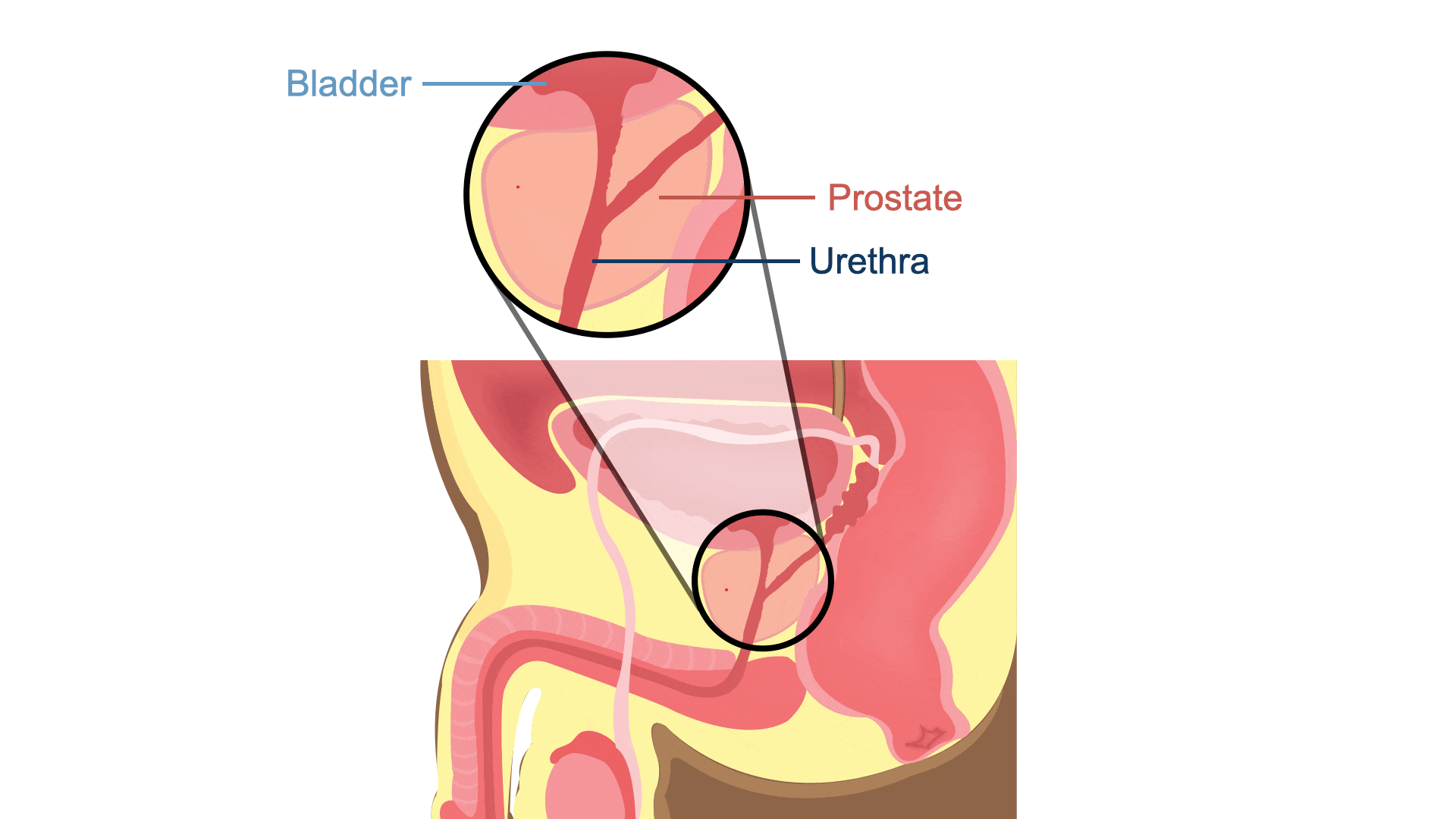Let's now take a brief look at what prostate cancer actually is.
In order to decide what treatment is best for you, it can be helpful to understand prostate cancer and the things that have led you to this point.
To start, we'll look at what prostate cancer is and how it develops. To help us understand that, let's first look at the prostate itself.
The prostate is a small gland (about the size of a golf ball). People who have a prostate include:
- Men
- Trans women
- Other people assigned male at birth.
The prostate is part of the reproductive system. It sits beneath the bladder, above the penis and just in front of the rectum (the lower end of the bowel).
It surrounds the tube that empties urine from the bladder, called the urethra.
The prostate produces a fluid that mixes with sperm (from the testicles) to make semen. The fluid is kept in the prostate gland.
What is prostate cancer?
Cancer starts in cells in our body. Cells are tiny building blocks that make up the organs and tissues of our bodies. They divide to make new cells in a controlled way.
Prostate cancer occurs when the cells that make up the prostate gland become abnormal, dividing and growing without control. These cells can form a cancerous lump in the prostate gland.
Common symptoms
Prostate cancer does not usually cause any symptoms until the cancer has grown large enough to put pressure on the urethra.
Symptoms of prostate cancer can include the following:
- Needing to urinate more frequently, often during the night.
- Needing to rush to the toilet.
- Difficulty in starting to urinate (hesitancy).
- Straining or taking a long time while urinating.
- Weak flow.
- Feeling that your bladder has not emptied fully.
- Blood in urine or blood in semen.
Signs that the cancer may have spread include bone and back pain, a loss of appetite, and unintentional weight loss.
Within this resource we mention PSA, which stands for prostate specific antigen.
- PSA is a protein produced by normal cells in the prostate, but also by prostate cancer cells.
- PSA levels in the blood can be measured by a PSA test.
Throughout this resource we'll be hearing from Dilip about his experiences of having hormone therapy for prostate cancer.
Let's briefly meet him before we continue.
View video transcript
Hello, my name's Dilip. I live in south east London. I am 65 years old and I have a diagnosis of metastatic prostate cancer.
My journey to diagnosis started in November 2022. And when I went to the loo, I noticed a little bit of blood in my urine.
So I got put on a cancer track by my general practitioner, initially for investigation of bladder cancer. But they found that my PSA was elevated. And I went through the routine then of investigating for prostate cancer. And they did find with the scans and the biopsies some prostate cancer. And I then decided to - of the various treatments on offer - to have a radical prostatectomy, robot-assisted prostatectomy. And I had that in March 2023.
And the news there wasn't so good in that there was much more cancer in my prostate than was evident from the initial biopsy, and it had spread outside the prostate. So the next stage was a PET PSMA scan, and that, in fact, showed that I had prostate cancer in my right ischium, so that's the sitting bone, a large tumour there, and then extensive nodal disease up to my diaphragm and a little bit beyond my diaphragm as well.
Radical prostatectomy - removal of the whole prostate gland.
Nodal disease - the cancer has spread to a person's lymph nodes and surrounding tissue. Lymph nodes are small, bean-shaped structures, found in most of the body, that work as filters for unwanted substances.
Other useful resources
- Prostate Cancer UK
Webpage with more information about prostate cancer. - The Infopool
Patient resource on prostate cancer from Prostate Cancer Research. - Orchid
Charity that raises awareness and supports research into testicular, penile and prostate cancer. - Europa Uomo
European advocacy movement representing 27 prostate patients’ groups in countries across Europe.
Hormone therapy
Now we know more about prostate cancer, let's look at options for hormone therapy.



